S. Sudan monitors renew calls for inclusive transitional gov’t
March 15, 2017 (JUBA) – The Joint Monitoring and Evaluation Commission (JMEC) has renewed the need for inclusivity in the Transitional Government of National Unity (TGoNU) in order to stop the war and to avert the further spread of famine.

“Whether by design or default, a war is being waged around this country and the security and humanitarian situation continue to deteriorate. How do we stop the fighting? How do we stop innocent people dying of starvation? And how do we ensure that the interests and concerns of all South Sudanese communities are fully represented and considered? Peace, relief and inclusivity,” are the main concern of the peace monitoring implementation body he said.
In his speech to a meeting attended by officials from the government, United Nations, China, European Union and the Troika countries of U.S., UK and Norway, the former president of Botswana pointed to the interconnection between fighting, starvation and the death of innocent civilians.
Rival parties in South Sudan signed a peace agreement in August 2015 and formed TGoNU in April 2016. However, fighting erupted in July 2016 forcing the former First Vice President and leader of the SPLM-IO Reik Machar to flee the country.
Machar has been exiled in South Africa and has since then been replaced by Taban Deng Gai, the SPLM-O former chief peace negotiator.
Taban who spilt from Machar has no authority on the rebels to stop the fighting that since last July has spread throughout the country.
EXCLUSION IS THE CAUSE
During his speech, the head of the peace monitoring mechanism tried at different times in his speech to explain that there is no peace in the country despite the signing of the peace agreement of August 2015 in a process that included armed groups, political forces and civil society representatives.
Mogae stated that the only way to stop the ongoing fighting and starvation was to include all concerned South Sudanese communities in the dialogue process.
“I have reiterated my view, that the national dialogue must hear and address the views of all the communities in South Sudan, not simply those who agreed with the government,” he added.
“I wish to spell out the three defining questions that we as JMEC faced together right now as we speak. How do we stop the fighting? How do we stop innocent people dying of starvations? And how do ensure that the interest and concerns of all South Sudanese communities are fully represented and considered,” he said.
President Salva kiir has proposed to hold a national dialogue process led by his government to reach an inclusive agreement ending the war. But the armed groups reject the proposal saying no dialogue can be held without peace in the country. They also say such a process should be led by impartial authority not President Kiir.
JMEC chairman called for the cessation of hostilities and the immediate deployment of a regional protection force in South Sudan. He also called for the accountability for the atrocities that were committed by both parties in the country.
(ST)
